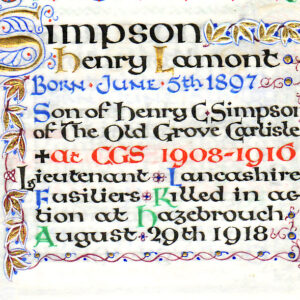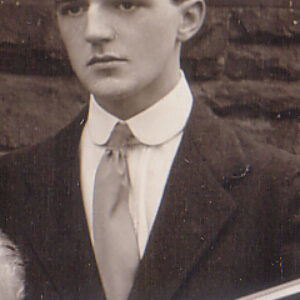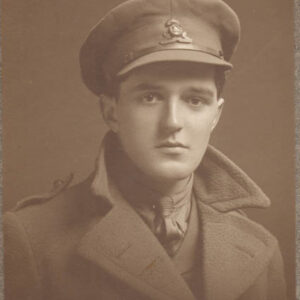Henry is a published poet. A compilation book ‘In Flanders Fields’ published in 2005 comprises works from 30 poets killed in action, including Rupert Brooke and Wilfred Owen, and our own Henry Lamont Simpson. The volume includes two of Henry’s poems – Casualty List and Last Song.
In 1919, Henry’s former English Teacher H. C. Duffin, who taught at the school from 1912 to 1916 published Henry’s poems in a book “Mood and Tenses”, which is no longer in print. In the Introductory Remarks, Duffin says of his pupil: “His spirit was fine, swift, vivacious and at the same time firm-set in sanity and strength”. There are 40 items in the book, mainly poems with a couple of prose sections. The dates of the poems range from 1914 to 1918, which suggests that some were written whilst he was still at school. Some poems were written in Cambridge suggesting he spent time at the university. Roughly three-quarters appear to have been written before he joined up or during training, and the remainder from the front, or at least having experienced it.
Last Song written on June 13 1918
Henry Lamont Simpson
All my songs are risen and fled away;
(Only the brave birds stay);
All my beautiful songs are broken or fled.
My poor songs could not stay
Among the filth and the weariness and the dead.
There was bloody grime on their light, white feathery wings,
(Hear how the lark still sings),
And their eyes were the eyes of dead men that I knew.
Only a madman sings
When half of his friends lie asleep for the rain and the dew.
The flowers will grow over the bones of my friends;
(The birds’ song never ends);
Winter and summer, their fair flesh turns to clay.
Perhaps before all ends
My songs will come again that have fled away.
“There could not easily be a more fitting memorial of his life than a book of his poems.” H. C. Duffin
In the Nicoll family archive there are a few letters from Theodore Walrond (the music master from 1906-11) to the brothers in which various ‘OC’s’ are mentioned.
” And clearly all the family knew HL Simpson as there are passing references to his death and then a rather gracious (printed) note from his parents expressing gratitude for ‘all the sympathy and kindness shown to them in their great sorrow’”



